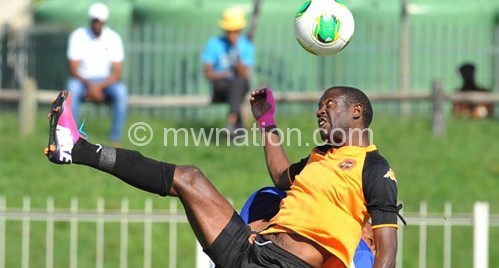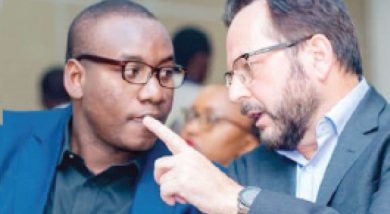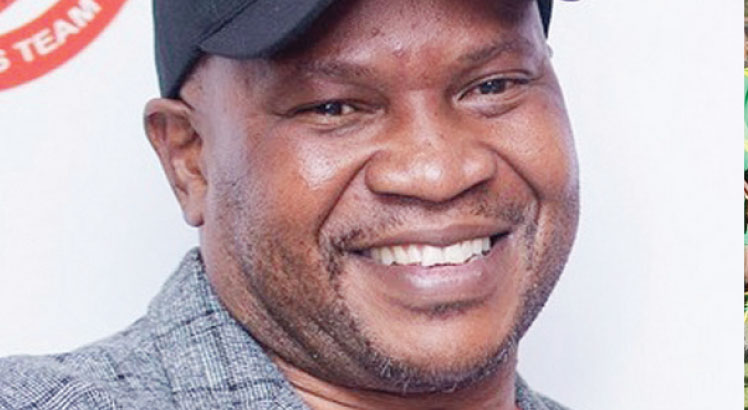Kanyenda charts life after football
Veteran striker Esau Kanyenda has, beyond finding the back of the net, planned for the often rough life after football.
But generally, who should be caring for retired sports stars in their rainy days?
The notable survivor

from the Manfred Hoener-groomed Under-20 squad of 1996, Kanyenda plans to eventually venture into full-time farming business and coaching.
“Yeah, I am planning to retire and start coaching courses because as of now, I do not have time to do that. About investment, I will be farming as I have some farms in Kasungu and some businesses in Lilongwe. Additionally, I will be teaching youngsters how to play football,” the Polokwane City forward explained in an exclusive interview during the week.
The only Malawian to have tasted European Champions League football while at Lokomotiv Moscow, Russia, Kanyenda did not disclose more details on his investments. Sources say he is the richest among Malawian footballers, with investments such as houses and maize mills.
Boasting over five trophies earned in three countries and two continents in a career spanning 17 years, Kanyenda continues to deliver the goods for City who rewarded him with a car and over K1 million for being last season’s best player.
“It is true that it is me and Fischer still playing and maybe it is because of self-discipline and hard work. You can be a skilful player, but if you are not dedicated, it is useless. I would like to thank Hoener for grooming us and Llyod Nkhwazi [his former Dwasco coach] for making me whom I am today,” Kanyenda explained.
“Had it been that I was playing in Super League of Malawi, I do not think I could have been playing because when you reach a certain age, they think you are old and start criticising you. In Europe, like in Russia, you have time to rest and they make sure you eat proper food,” he said.
Kanyenda’s plans for a comfortable retirement are refreshing in a country full of examples of stars of today being rendered destitute tomorrow upon retirement—either due to illness or having no source of income.
From the late Harry Waya and Navigator Dzinkambani struggling to source better medical treatment to Chancy Gondwe seeking financial help for his diploma studies at a Lilongwe college of theology; the examples are many.
Yet fundamental questions linger as to who is supposed to prepare for their rainy day—the athletes/players themselves or their employers, the clubs and associations?
For example, the Lawn Tennis Association of Malawi has for some years been spending on starlet Chisomo Lumeta’s training. In the event that he makes it big as a professional player, are there guarantees that local tennis would benefit from his exploits?
Sports Council executive secretary George Jana raised a similar question and added that the council has no policy direction on life after athletes’ careers.
“These people are dealt with by their clubs, it is at that lower level. The only thing we can do is encourage associations to invest in the future of their players,” Jana explained.
Civo United general secretary Rashid Ntelela said: “The players shoulder the biggest chunk of responsibility, but as employers, we are supposed to take responsibility too. We may assume that they [the players] will think on their own, but they are overwhelmed by current issues to even think about tomorrow.”
For the former Mamelodi Sundowns midfielder Gondwe “the greatest responsibility lies on the players to, during their careers, prepare for life after football. It depends on how we live when playing”.
Current sports stars playing locally argue that it is difficult for them to save money as they get peanuts with some earning as little as K6 000 a month. This is so as domestic sports sponsorship is on the lower side.
While admitting that local sports pays little for one to save, Gondwe challenged that as long as one is determined to secure their future, it is possible, arguing that “it is not about how much one earns, but how much one saves.”
South Africa-based boxing star Isaac Chilemba seemed to agree with Gondwe that it is up to the athletes to prepare for their retirement, saying it was in that realisation that he is studying business management.
In the final analysis, the sports stars shoulder the biggest responsibility in planning for retirement, but clubs and associations, too, have moral responsibility to encourage them.
Footballers Association of Malawi has since embarked on short-term tailor-made skills development programmes for current and former players in an attempt to address the same problem.
FACT FILE:
Kanyenda and Kondowe are the only survivors still playing from the Under-20 side Hoener and Alex Masanjala groomed comprising Simeon Kapuza, Kachibowo Malunga, Allan Kamanga, James Kaniche, Patrick Mangani, Peter Mgangira, Maxwell Chirwa, Chikondi Banda (late), Andrew Chikhosi, Muzipasi Mwangonde, Bright Phiri (late), Peter Mponda, Maupo
Msowoya, James Chimera Jnr, Fundi Akidu, Allen Kusapali, Fazili Mbundi and Ganizani Malunga. Kanyenda played for Dwasco, Jomo Cosmos, Rostov, Lokomotiv Moscow, Polokwane City.






Kodi njoka Malunga ali kuti ndipo akuchita chani